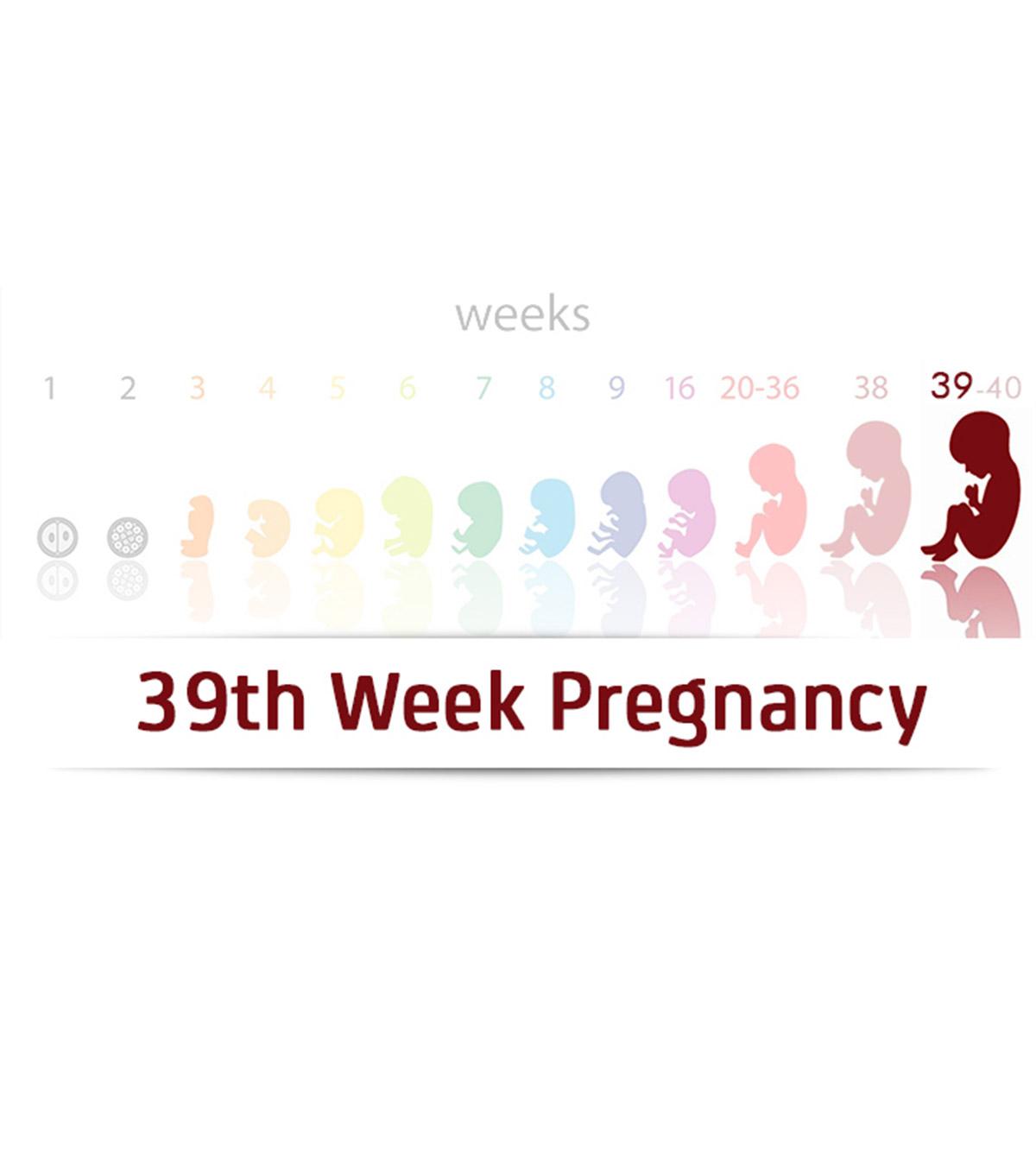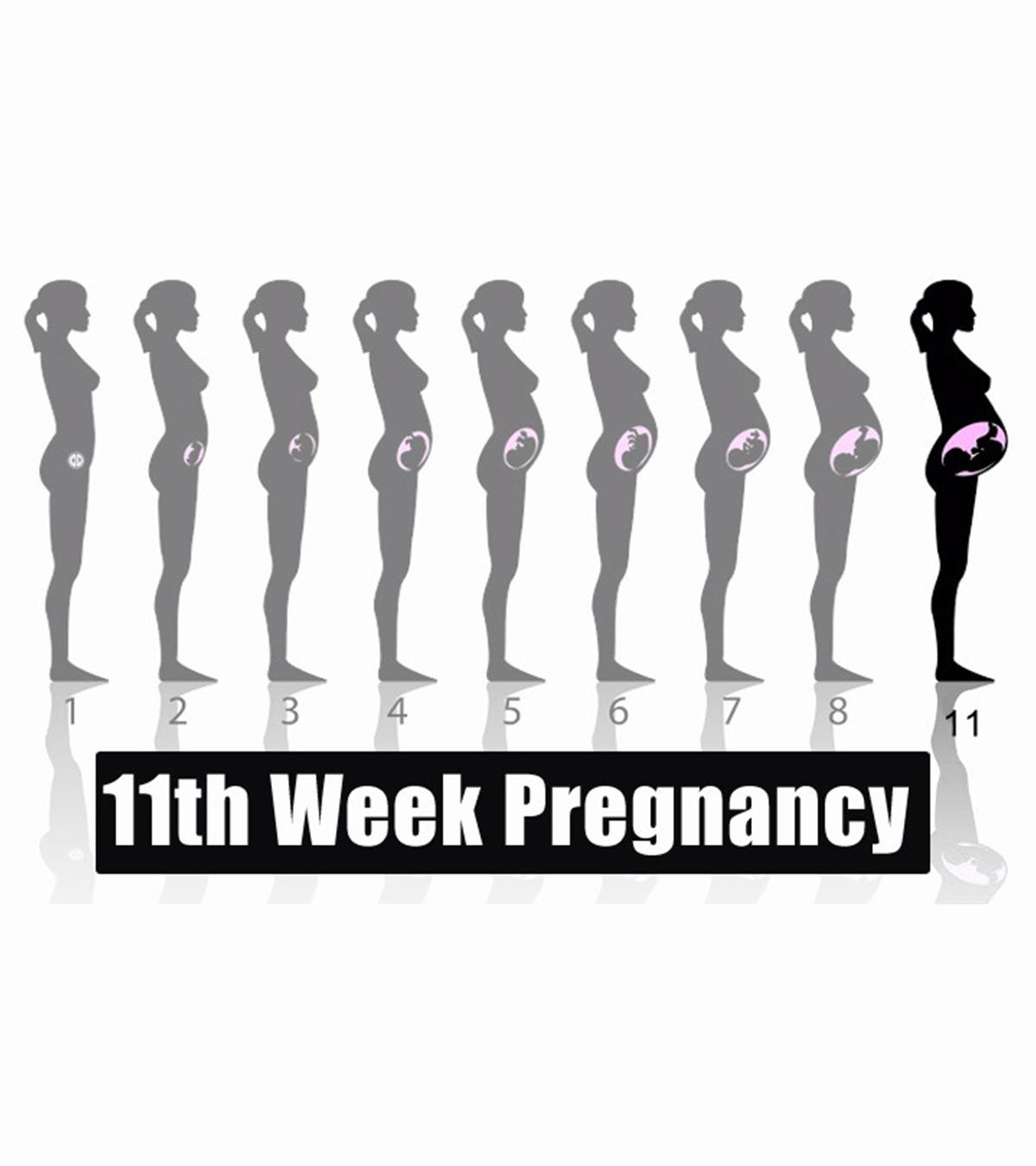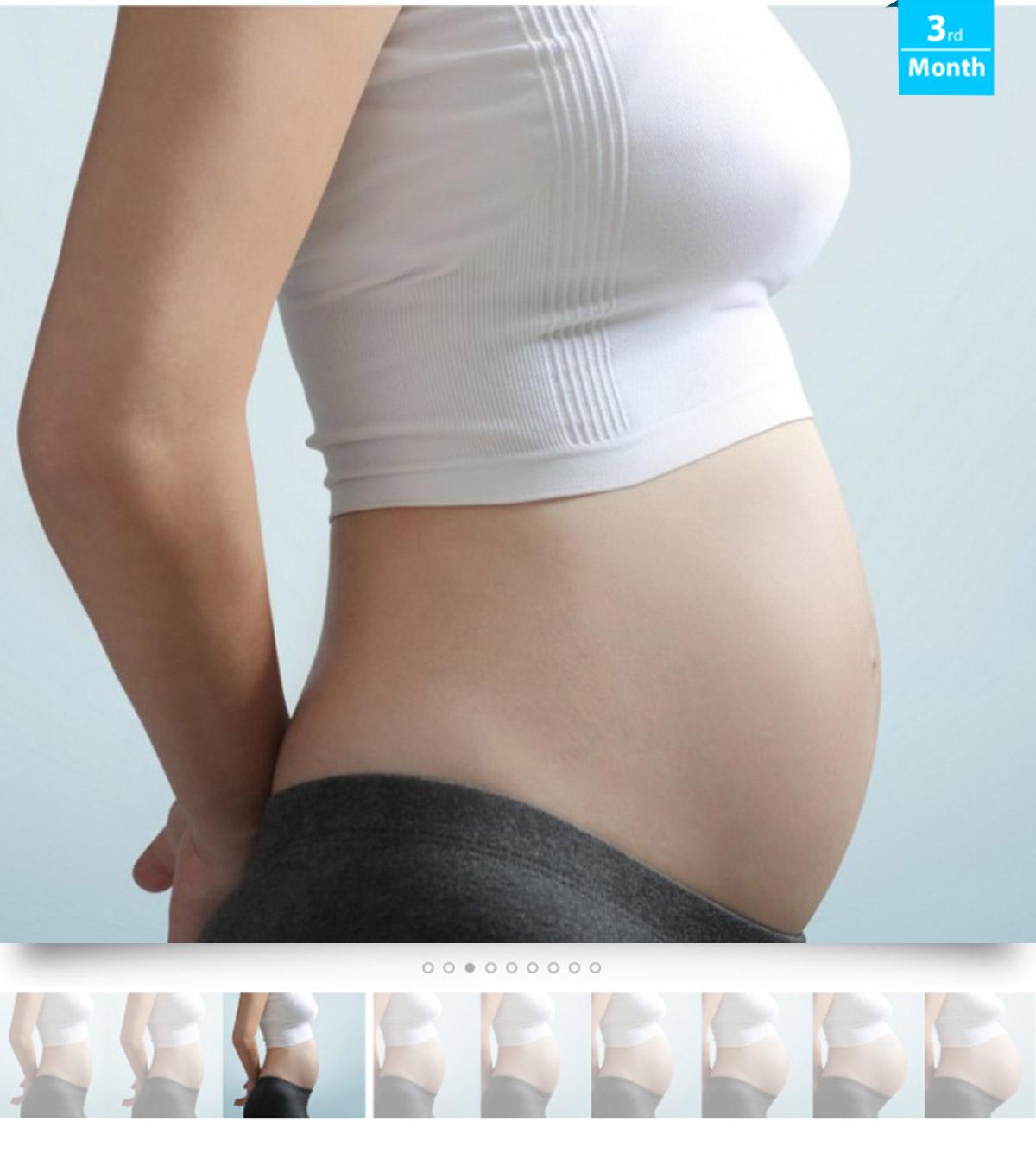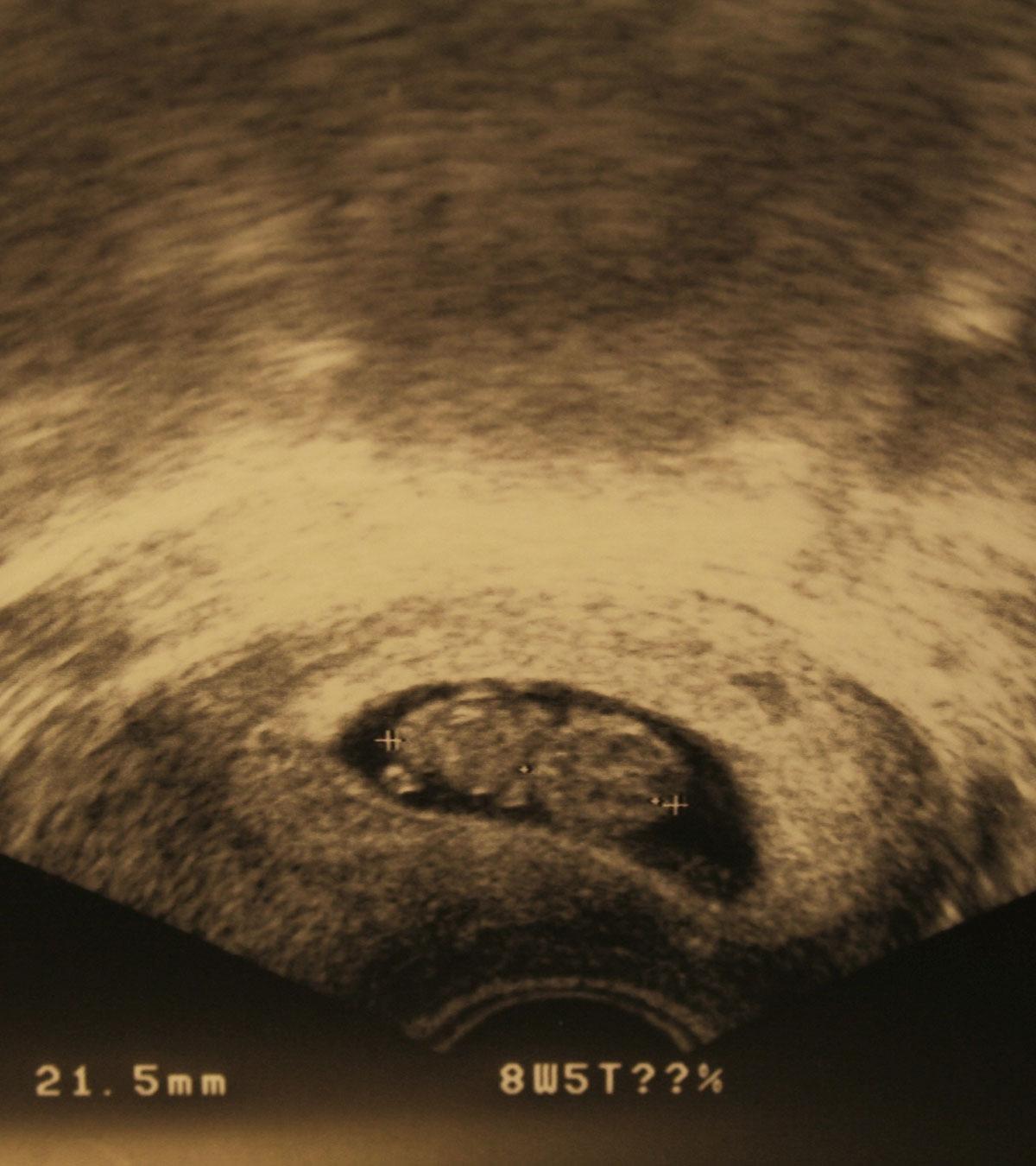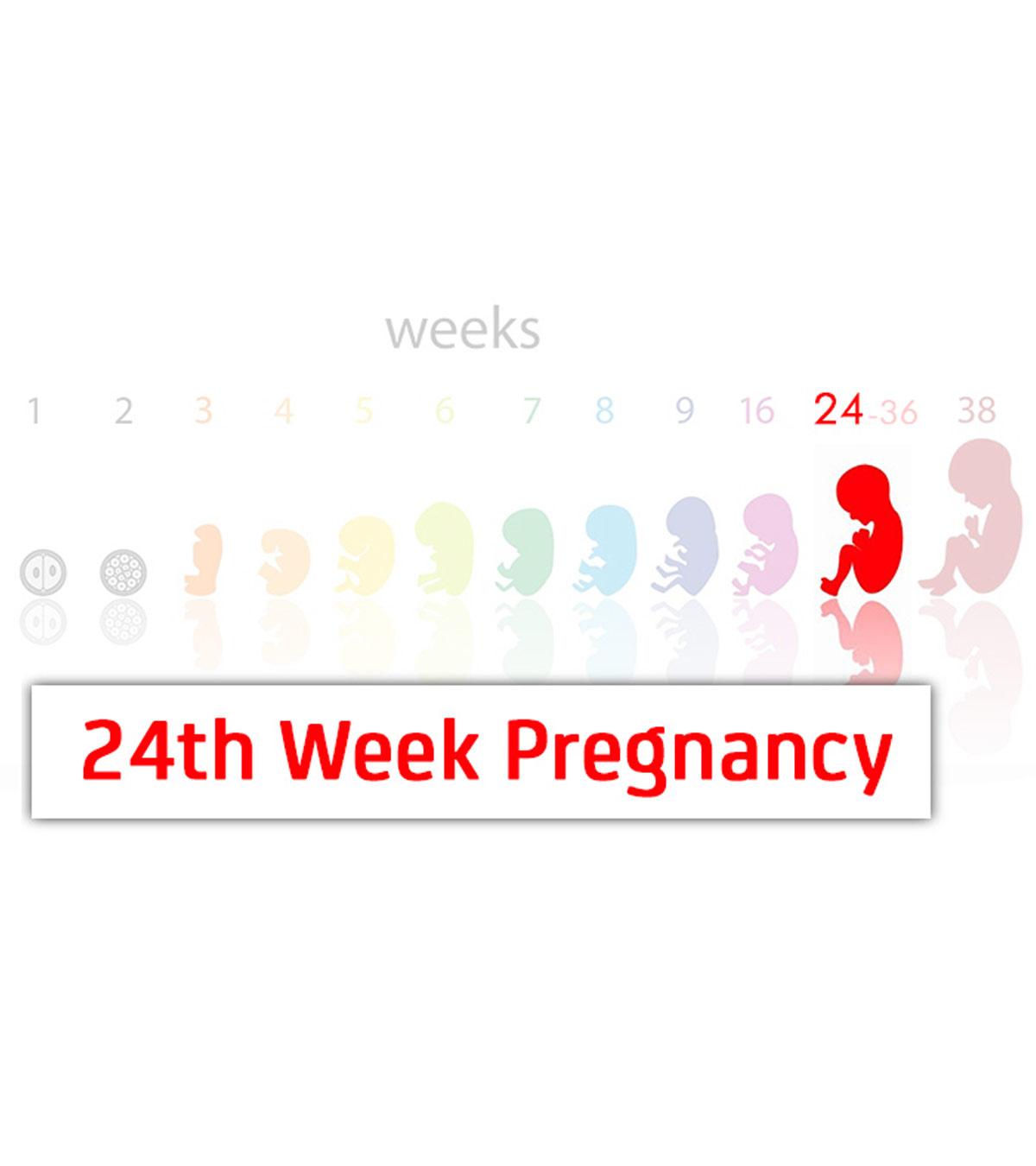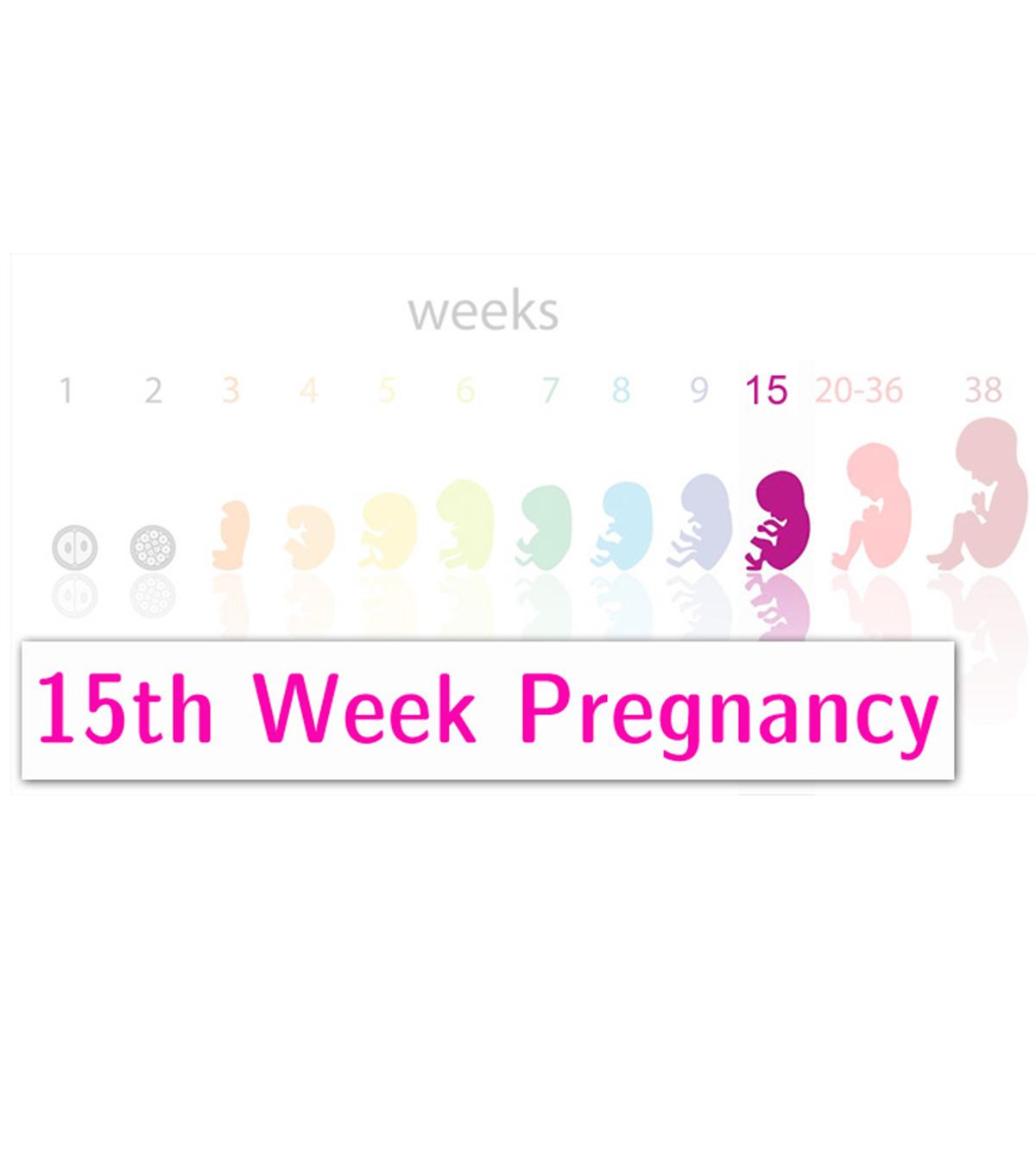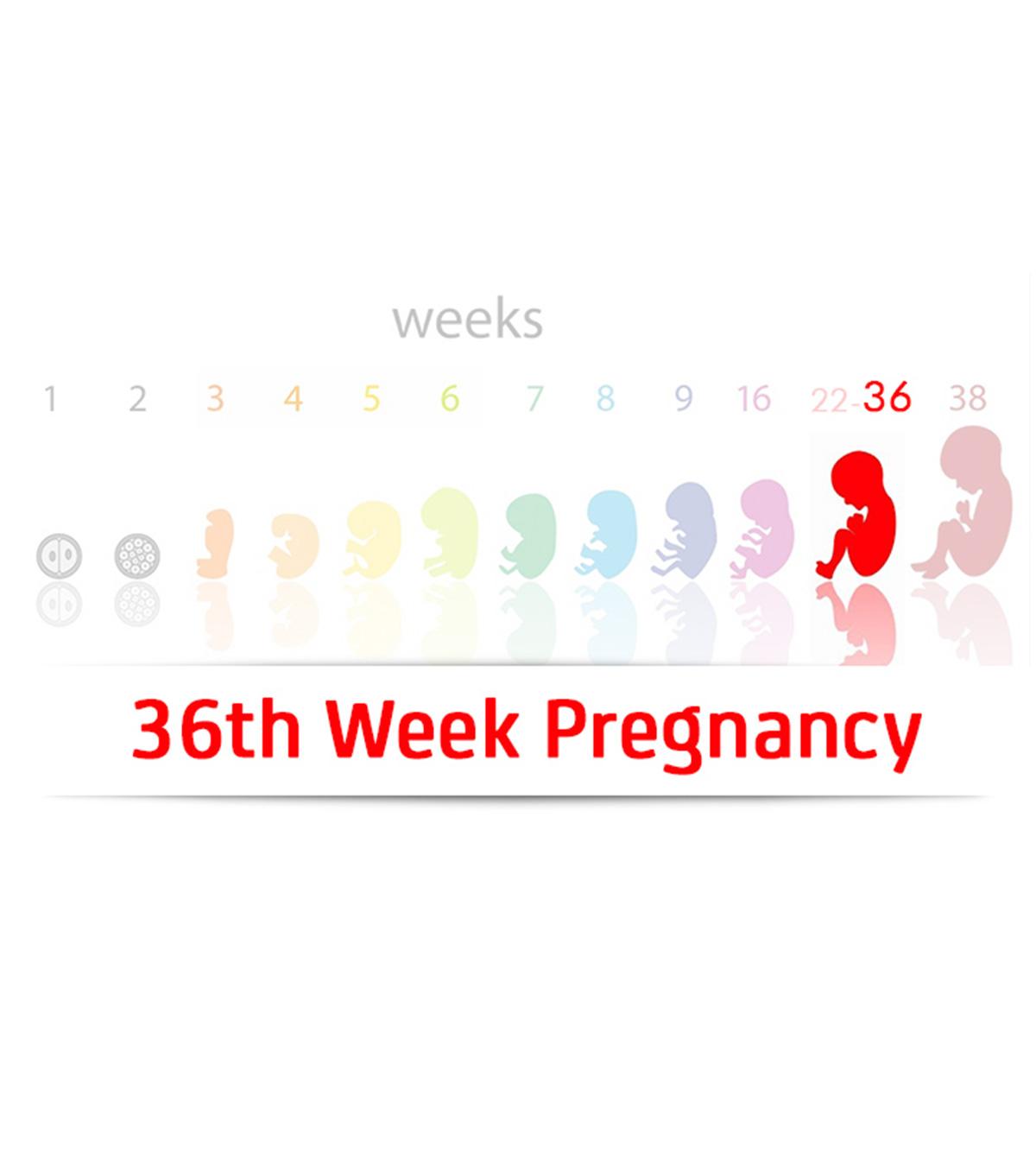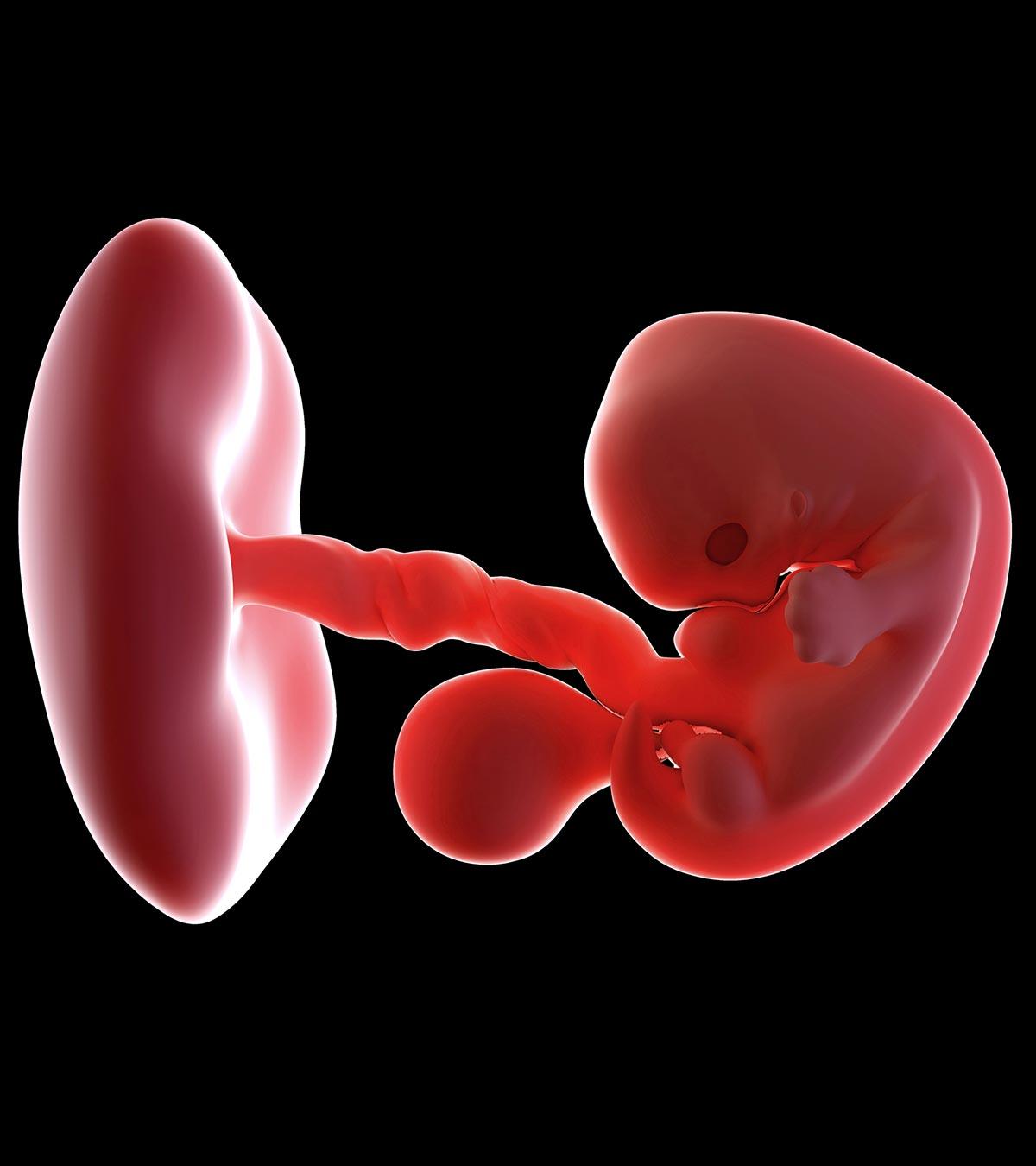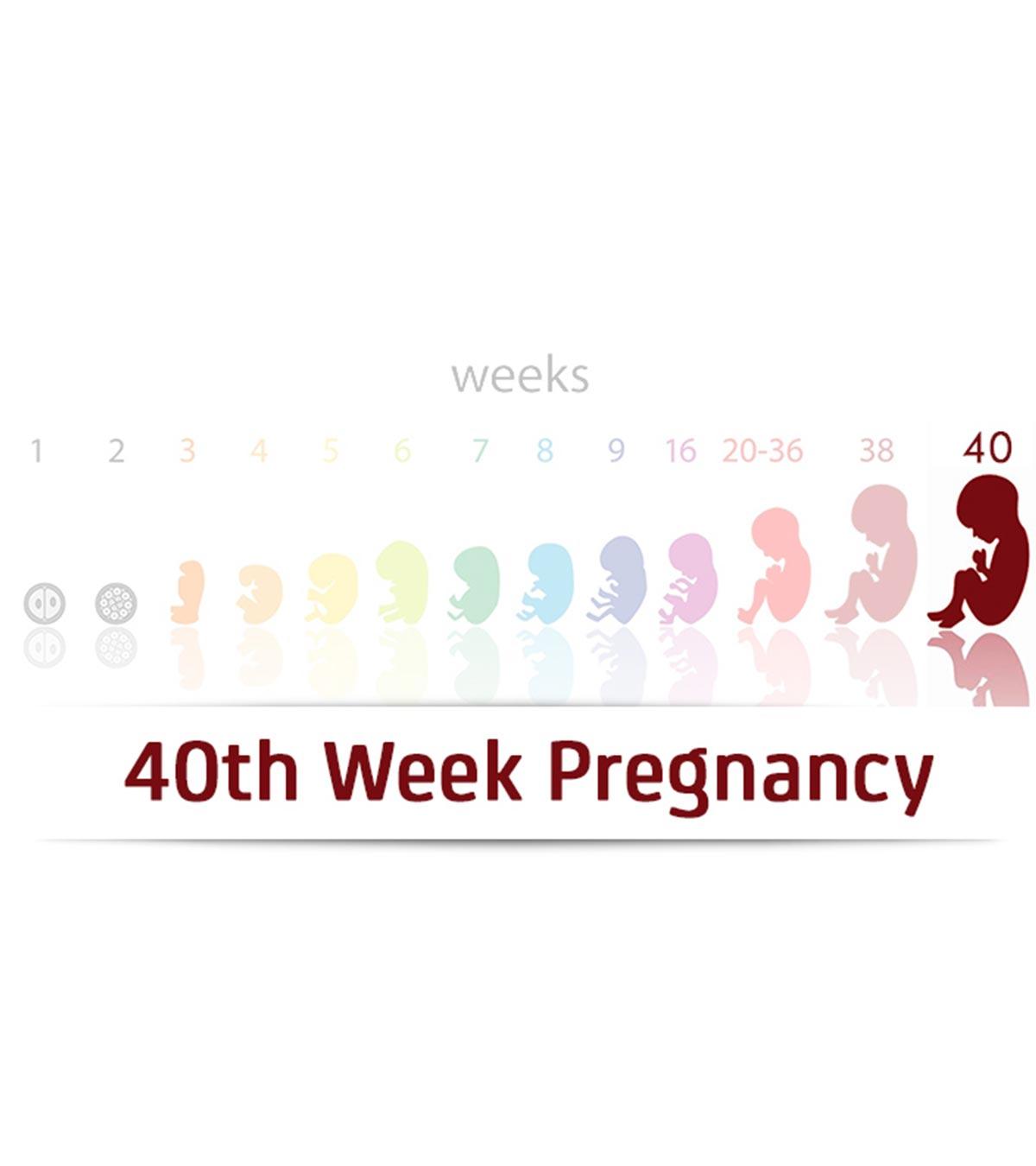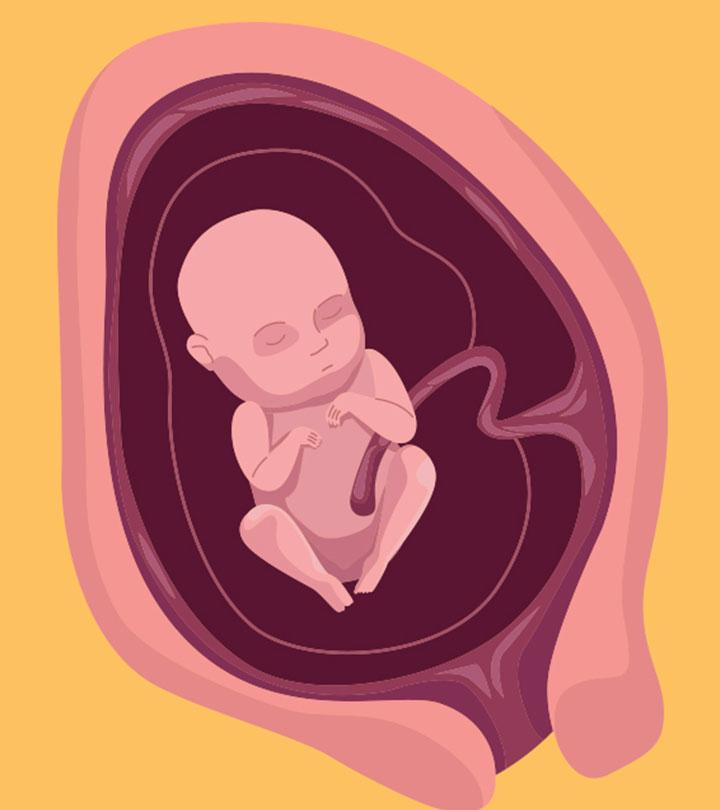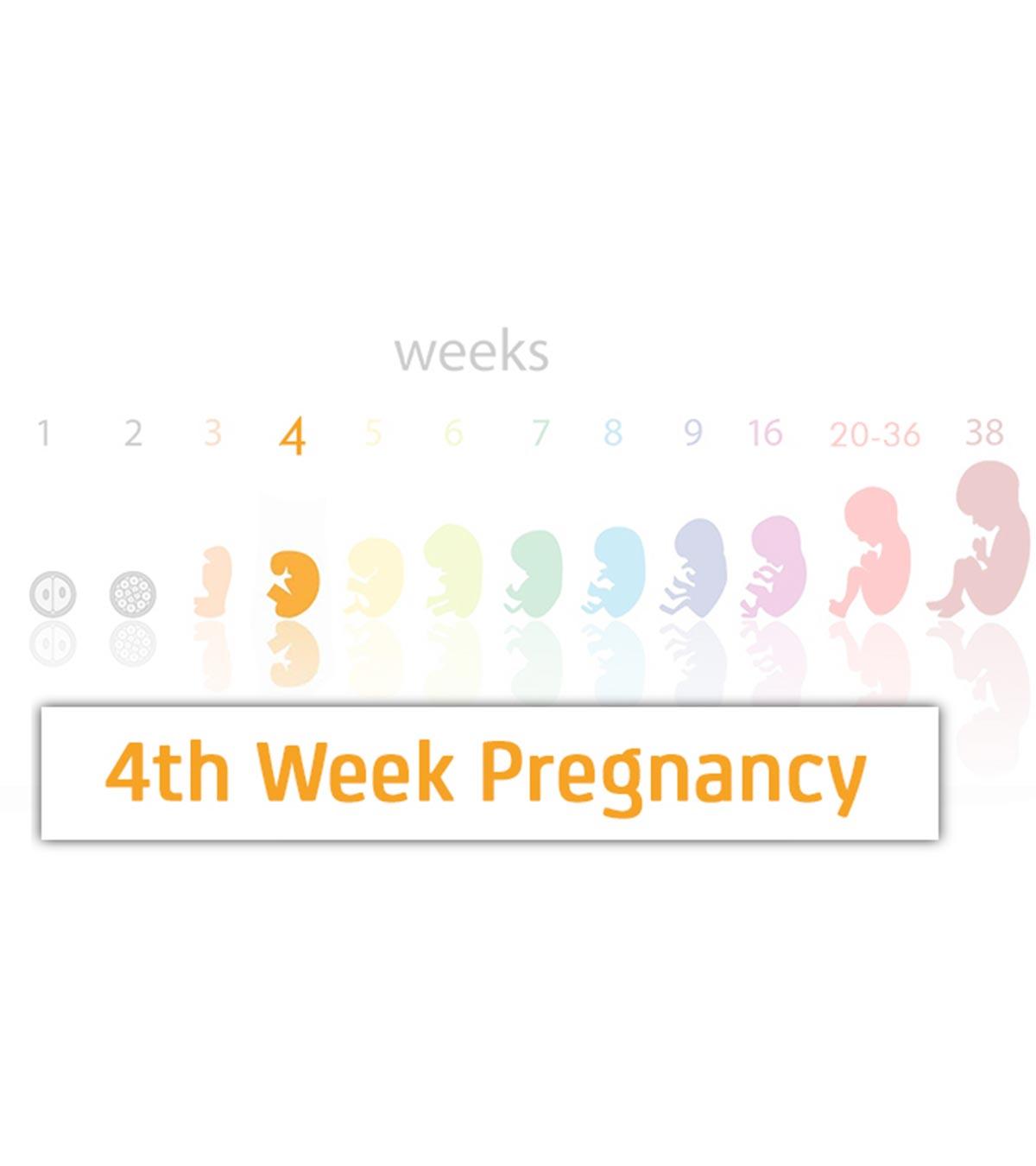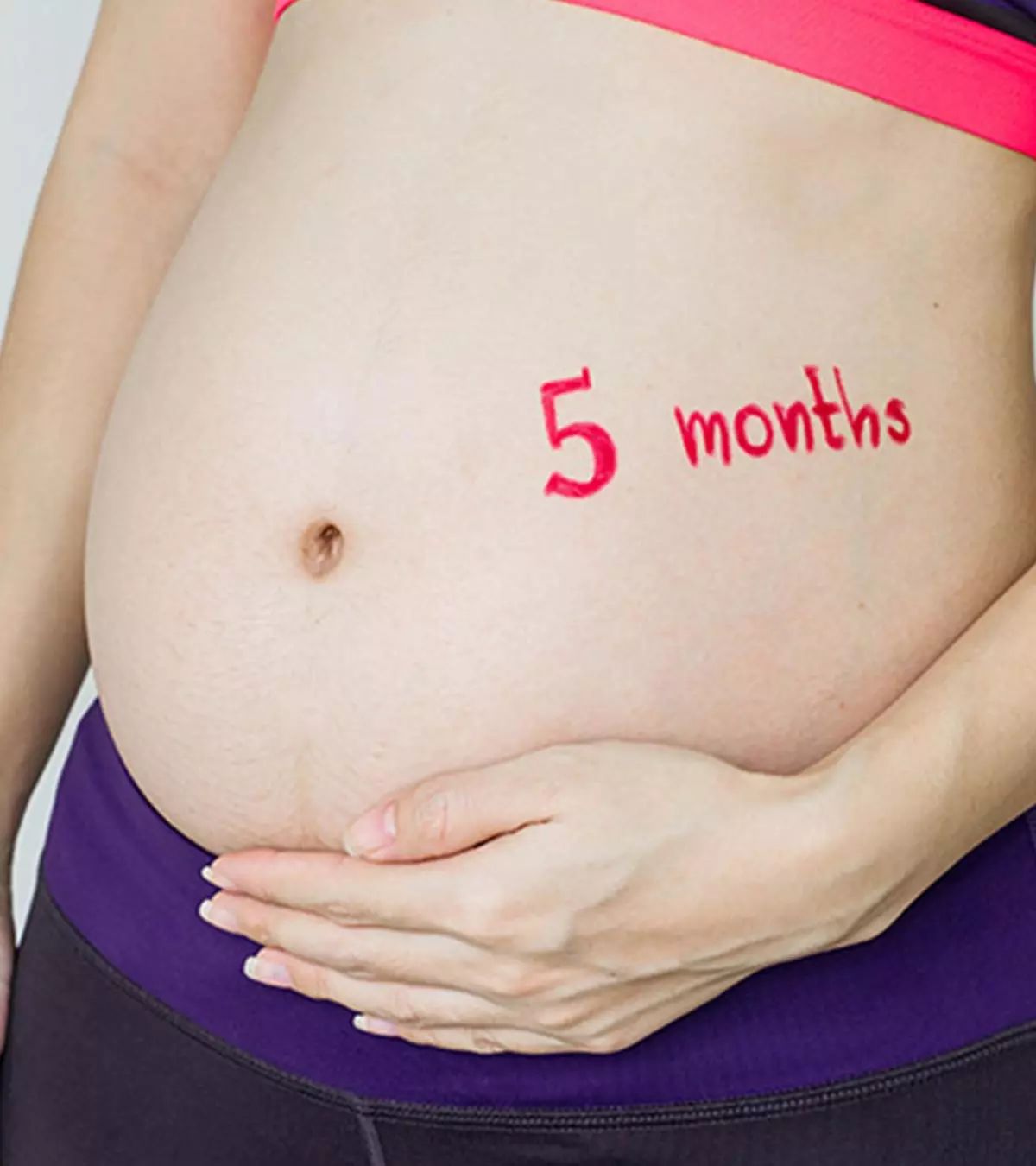
If you are 5 months (week 20 to 24) pregnant, you are in the second trimester of your pregnancy. Your baby’s growth spurts begin, and the pregnancy tummy becomes noticeable, signaling that it’s time for a wardrobe refresh. Morning sickness is no longer a factor because the hunger impulses have taken control during this month.
Read this post to know more about how your 5th-month pregnancy alters your body, how your baby develops, and what measures you should take in the fifth month of pregnancy.
Key Pointers
- The fifth month of pregnancy marks the beginning of the baby’s growth spurt that brings several physical changes in its body.
- You too undergo several physical, mental, and emotional changes that would cause you to experience a range of symptoms, such as appetite increase, weight gain, frequent urination, and enlarged breasts.
- Eat a well-balanced diet and pay special attention to nutrients, such as protein, calcium, iron, vitamin A, C, and D supports your baby’s proper growth and development.
- Physical examination, blood test, and ultrasound are a few ways your ob/gyn will assess your baby’s growth during this month.
- Certain complications can occur during this month, so take the necessary precautions and don’t overlook any unusual symptoms, such as vaginal bleeding or a high-grade fever with chills.
What Symptoms Do You Experience In The Fifth Month Of Pregnancy?
Some common 5th-month pregnancy symptoms you may experience include nausea, heartburn, constipation, and breast changes.
The causes for these symptoms to appear have been explained with several other symptoms like (1) (2):
- Weight gain: It must be as per the BMI (3).
| Pregnancy month | BMI | BMI 25-30 | BMI > 30 |
|---|---|---|---|
| 5th | 2-4kg | 1-2kg to 2kg | 0-2kg to 1-2kg |
- Gravity changes: The center of gravity of your body changes with the growing baby bump, which can make you feel imbalanced at times.
- Shortness of Breath: The growing uterus puts pressure on the diaphragm, making breathing difficult.
- Headaches: Hormonal fluctuations cause headaches.
- Fatigue: As the body works more to fulfill the growing demands of the fetus, you start to feel tired.
- Dizziness: The hormonal fluctuations in the body make you dizzy.
- Leg cramps: Vitamin deficiency, extra weight or being too active or inactive at this time could result in leg cramps (3).
- Nasal congestion: The increased estrogen level causes the nasal membranes to expand, thereby increasing the mucus flow and causing congestion.
- Constipation: An increase in the progesteroneiA female reproductive hormone that plays an important role in menstruation, pregnancy, and breastfeeding. level causes slow movement of the food through the intestine, leading to indigestion and constipation.
- Heartburn: The growing uterus pushes up the gastric acids in the stomach to the esophagus, causing heartburn.
- Back pain: The 5th-month pregnancy baby weight puts extra pressure on the lower back or the sciatic nerve (that runs from the spine to legs) causes back pain.
- Increase in appetite: As the morning sickness wanes by this month, your cravings increase.
- Frequent urination: The growing uterus puts pressure on the bladder, resulting in frequent visits to the bathroom.
- Insomnia: Insomnia is a common occurrence throughout pregnancy. The American Pregnancy Association (APA) states that about 78% of women experience insomnia during pregnancy. The back pain, frequent urination, leg cramps deprive you of a sound sleep.
- Edema: The water retention in the body makes your feet, hand, and face swell.
- Bleeding gums: Hormonal changes and an increase in the blood flow can cause bleeding gums.
 Did you know?
Did you know?Apart from these symptoms, you may experience other physical and psychological changes too.
Jennifer Stano, a blogger, shares how she feels during her fifth month of pregnancy. She says,” I’ve been really lucky to not have any morning sickness at all and have to say all other symptoms have been pretty manageable. In my 2nd trimester, the cravings have gone, and I’m eating so much better (i).
As Stano’s case shows, not all women may have the same symptoms during pregnancy. It can differ from one person to another.
Physical Changes In The Fifth Month
Physiological changes you go through include:
- A growing belly: Your 5 months pregnant belly is visible by now, and it feels itchy as the skin stretches.
- Enlarged breast: The breast starts the milk production, and hence it looks bigger and fuller.
- Colostrum: A yellow liquid starts discharging from the nipples, which is the first milk for your baby.
- Stretch marks: The growing uterus causes tiny tears in the skin tissues, creating stretch marks.
- Linea nigra: A line that runs from the navel to the pubic hairline gets darker.
- Darker areola and nipples: The skin pigmentation could make the nipples and the area around them look darker.
Emotional Changes In The Fifth Month
Few emotional changes you may experience on your 5-month pregnancy are:
- Mood swings: They are the result of hormonal fluctuations.
- Stress: The thoughts of parenthood and anxiety during pregnancy can put you under stress.
- Pregnancy brain: Due to the hormonal fluctuations, it is common to forget things during this time.
 Quick tip
Quick tipBy this month, fetal development picks up the pace. Are you anxious to know about it? Keep reading here.
Baby Development In The Fifth Month Of Pregnancy
The fifth month spans from weeks 17 to 20 (4). By this time, your baby grows from the size of a Turnip to a Banana (5).
Baby weight (6): Around 5 to 10 ounces (140 – 300g, 0.30 – 0.7 pounds)
Baby’s length: 5.1 – 10in (CRL) (13 – 25.6cm (CRL)) between 17th and 20th weeks. From week 20, the length is measured from crown to rump.
Here is how your baby is developing during this month ( 7, 8,9):
| Body parts | Development |
|---|---|
| Skin | Vernix caseosa, a greasy material covers and protects the skin. |
| Hair | Starts to grow on the head. |
| Lanugo | Fine hair that covers the body. |
| Eyes | Eyebrows, eyelashes, and eyelids start appearing. |
| Heart | Heart rate follows a daily cycle called circadian rhythms. |
| Vocal cord | Maturing |
| Ear | Cochlea fully developed and the fetus starts hearing. |
| Genitals | In girls, the ovaries develop about 7 million oogonia, which give rise to primary oocytes. |
| Nerves | Getting covered with a tissue called myelin. |
| Fingers | Fingerprints are developed. |
It’s a moment of joy when you feel your baby’s first movement. Read here to know what happens inside your womb this month.
Baby’s Position And Movements In The Fifth Month
Position:
The baby has a lot of free space inside the womb to move around. Hence, there is no specific position that the baby attains during this month.
Movement:
The fetal movements can be felt slightly by this time, like a fluttering feeling in the stomach, referred to as quickening. First-time mothers may not be able to recognize it and take it for gas in the stomach (10).
Eating the right food in the right amounts is essential for the health of the mother and the baby. However, it is also necessary to ensure that you stay away from foods that are not recommended for pregnant women.
Pregnancy Diet For The Fifth Month
Here is the list of foods that you should add to your 5th month pregnancy diet (11):
- Add a lot of green leafy vegetables, bread, milk, sardines, and fortified cereals that are rich in Calcium. It promotes healthy bones and teeth in your baby. According to ACOG, a pregnant woman should take 1000mg of calcium/day.
- Iron helps in the production of red blood cells. The recommended intake is 27 mg/day (including any supplements). Whole grain products, fish, green leafy vegetables, dried fruit, beans, lean pork, and beef are a good source of this mineral.
- According to the ACOG, the recommended daily intake of Folic acid by a pregnant woman is 600mcg/day. It prevents congenital disabilitiesiThese are medical disorders present from birth and could be hereditary or due to infection or injury to the fetus during pregnancy. relating to the brain and spine in the baby. Add a lot of Leafy vegetables (spinach, broccoli, romaine lettuce, and kale), kidney beans, lentils, nuts, citrus fruits, and beans in the diet.
- Vitamin D promotes healthy eyesight and strengthens the bones and teeth. Salmon and milk fortified with Vitamin D are a good source. The recommended intake is 600 IU per day.
- Add Vitamin A rich foods like orange or yellow vegetables (sweet potatoes or carrots), leafy green vegetables, liver, and milk. The recommended daily intake is 750-770 mcg/day. It promotes bone strength and healthy eyesight.
- Protein can be obtained from lean meat and poultry, eggs, seafood, peas, soy products, beans, milk, and unsalted seeds and nuts. It is necessary for muscles and the brain.
- Add Vitamin C rich foods like citrus fruits, strawberries, tomatoes, and broccoli in your diet. It promotes healthy gums, teeth, and bones. The average daily recommended intake is 85mg.
Along with a healthy diet, it’s important to stay hydrated by drinking water throughout the day, not just when you feel thirsty. Aim to drink 8 to 12 cups of water daily during pregnancy.
 Quick tip
Quick tipFoods To Avoid During The Fifth Month Of Pregnancy
Here is the list of foods you need to avoid:
- Stay away from raw or uncooked food as it can cause a foodborne disease called listeriosis (12).
- Avoid eating fishes like swordfish, tilefish, king mackerel, and sharks that have a high level of mercury.
- Avoid consuming more than 200-300 mg of caffeine a day as it may lead to a miscarriage (13).
- Avoid unpasteurized milk and cheese.
- Avoid food containing gluten such as wheat and barley (14), if you have celiac diseaseiAn autoimmune, genetic condition that triggers a reaction caused by gluten found in wheat and barley. . Instead, switch to vegetables, fruits, beans, poultry, and meat.
- Avoid deep-fried and spicy foods as they can aggravate heartburn.
It’s time to fix your appointment with the doctor as a part of your prenatal care for ensuring both you and the baby are doing well.
What To Expect During Your Visit To The Ob/Gyn?
Here are some tests that your doctor would suggest for this month:
Physical examinations:
- Blood pressure check
- Weight check
- Urine test for protein and sugar levels.
- Measurement of the fundal height
Other:1. Ultrasound
: It is carried out to,
- Monitor the fetal heart rate and growth of your baby in terms of weight and CRL (crown-rump length).
- Check the position of the baby and the condition of the placenta.
- The scan is also called anomaly scan (15).
2. Multiple marker test: It includes the screening of the mother’s blood sample for evaluating the levels of (16);
- Alpha-fetoprotein (AFP) – An abnormal protein levels of AFP in the maternal blood serum indicates:
- Down syndrome
- Open neural tube defects (ONTD), such as spina bifida
- Defects in the wall of the fetal abdomen
- Some other chromosomal abnormalities
- A miscalculation in the due date because the protein levels do vary throughout pregnancy
- More than one fetus makes the protein
- hCG – The human chorionic gonadotropin is a pregnancy hormone produced by the placenta.
- Estriol – Produced by the placenta
- Inhibin – Produced by the placenta
In case of unsatisfactory multiple marking testing results, an amniocentesis may be recommended for an accurate diagnosis.
3. Amniocentesis: It is done to check for open neural tube defects (ONTDs) such as spina bifida and chromosomal disorders. A sample of the amniotic fluid is tested to evaluate the results. In the case of twins and multiple babies, the sampling will be done from each amniotic sac.
Specific symptoms may indicate a problem and should be checked by the doctor immediately.
What Do You Need To Know In Your Fifth Month Of Pregnancy?
In the case of the following symptoms, get medical help right away (17, 18):
- Vaginal bleeding
- Belly or pelvic pain or severe cramping
- Fever of 100.4 degrees or higher, chills
- Painful or less urination
- Dark-colored urine
- Vomiting that lasts longer than 24 hours or gets worse
- Dizziness
- Increased vaginal discharge or discharge with a foul smell
Do not overlook any unusual symptoms
that could indicate complications with the pregnancy. Find out more about them next.
Dr. Alan Lindemann, MD, an obstetrician, maternal mortality expert, and former clinical associate professor at the University of North Dakota, says, “At five months of pregnancy, your uterus should be an inch or two above your belly button. Where your uterus is not felt, your abdomen should still be soft. If you feel your uterus, it will be a little harder than the rest of your abdomen. However, it will not be as hard as it is toward the end of your pregnancy.”
Complications In The Fifth Month Of Pregnancy
Pregnancy complications during this month include miscarriage or stillbirth ( 9, 20, 21).
Miscarriage:
It is also described as pregnancy loss and happens before the 20th week of pregnancy. Its symptoms include:
- Vaginal bleeding
- Pain or cramps in the lower abdomen
- Low back pain
- Tissues, fluids, or clot-like material passing through the vagina.
Stillbirth:
Also termed as fetal death can happen in or after the 20th week of gestational age. It may be due to any birth defects or pregnancy complications.
Keep reading to what you can do to make your pregnancy a better experience.
Precautions To Be Taken In The Fifth Month
Here are some precautionary measures you can follow in the fifth month:
- Keep your stress at bay by practicing mindfulness and engaging in stress-relief activities.
- Stay hydrated.
- Avoid smoking and drinking alcohol.
- Give rest to your body.
- Maintain oral hygiene.
- Maintain the right posture while sitting and try sleeping positions that promote sound and comfortable sleep. Do not sit or stand suddenly as it may cause the blood pressure to drop and result in fainting or dizziness (22).
- Take prenatal vitamins regularly.
- Do not lift heavy objects.
- Have smaller meals at regular intervals.
- Do not take any medicines without consulting the doctor.
- Try walking and Kegel exercises that strengthen the pelvic muscles.
- Wear loose, breathable maternity clothes and comfortable flat footwear.
- Stay away from harmful chemicals.
Dr. Lindemann opines, “At five months, your movement will be somewhat restricted, but you will be able to bend. Don’t bend so much that it bothers you, but you will probably be able to pick up things off the floor, especially if you do it slowly and carefully.
“Also, the best position to sleep from the middle of your pregnancy to the end is called the left lateral decubitus. This position is midway between your side and your back. You may even sleep completely on your side; however, many people can’t sleep that way for more than an hour or two without getting shoulder, neck, or hip pain. Sleeping on your belly and back is not a good idea. It may compress your vena cava, the large vein bringing blood to your heart.”
Tips For Dad-To-Be
- Help your partner with household chores
- Create a pleasant environment for her at home.
- Accompany her during the prenatal visits.
- Plan a day out with her.
- Go shopping with her for maternal essentials.
- Give her a good foot and neck massage.
Frequently Asked Questions
1. Why does my stomach feel tight at five months pregnant?
During the second or third trimester, your stomach may sometimes feel tight and hard, causing a little discomfort. You may experience this tightness because of Braxton-Hicks contractions. These are generally referred to as false contractions that prepare the body for labor (26).
2. Are sharp pains typical at five months pregnant?
At five months, the ligaments stretch to support the growing baby. It feels like a sharp cramp on the sides of the lower abdomen, hips, and groin. As the ligaments stretch and soften to prepare for childbirth, it often results in pelvic girdle pain. But apart from these causes, constipation, pre-eclampsia, and urinary tract infection may also lead to sharp pains. It is wise to call a doctor on experiencing sharp pain suddenly (27) (28).
3. What is the likelihood of experiencing complications, such as gestational diabetes or preeclampsia, at 5 months pregnant?
The chances of experiencing complications like preeclampsia or gestational diabetes at five months pregnant are typically low, and they can vary depending on several factors, including your health, medical history, and lifestyle. Generally, preeclampsia usually happens after the 20th week or post-birth, while gestational diabetes can develop around the 24th week (29) (30).
4. What are some tips for managing stress and anxiety during the fifth month of pregnancy?
Prioritize self-care by indulging in gentle massages or prenatal yoga to relax and unwind. Eat nutritious meals, stay hydrated, and exercise regularly to reduce stress and anxiety. Ensure you get enough quality sleep to help your body rejuvenate. Share your feelings and concerns with loved ones to vent pent-up emotions. Most importantly, do not hesitate to seek professional help whenever needed to ensure optimum mental health (31).
5. How can a woman balance work or other obligations with the demands of pregnancy at five months pregnant?
Plan your work, set realistic goals, and break tasks into manageable segments. Assess your workload and delegate tasks to subordinates or colleagues to alleviate stress. Take regular breaks to rest, stretch, and recharge, which can help alleviate discomfort, prevent fatigue, and promote better focus and productivity. Seek support from colleagues, friends, or family members to achieve a healthy balance between your work and the demands of pregnancy (32).
The journey of pregnancy is nothing less than a roller coaster ride. At five months pregnant, the ups and down may take a significant toll on your body. However, you can stay relaxed as this phase is temporary. The moment you hold the little one in your hand, you are likely to forget all the pains. Stay relaxed and positive to enjoy this phase fully.
Infographic: Tips And Precautions For The Fifth Month Of Pregnancy
During the fifth month of pregnancy, the mother experiences various physical and emotional changes thanks to the baby’s development. Therefore, it is essential to take extra care of yourself. Scroll through the infographic below to learn the dos and don’ts to follow during this phase. Illustration: Momjunction Design Team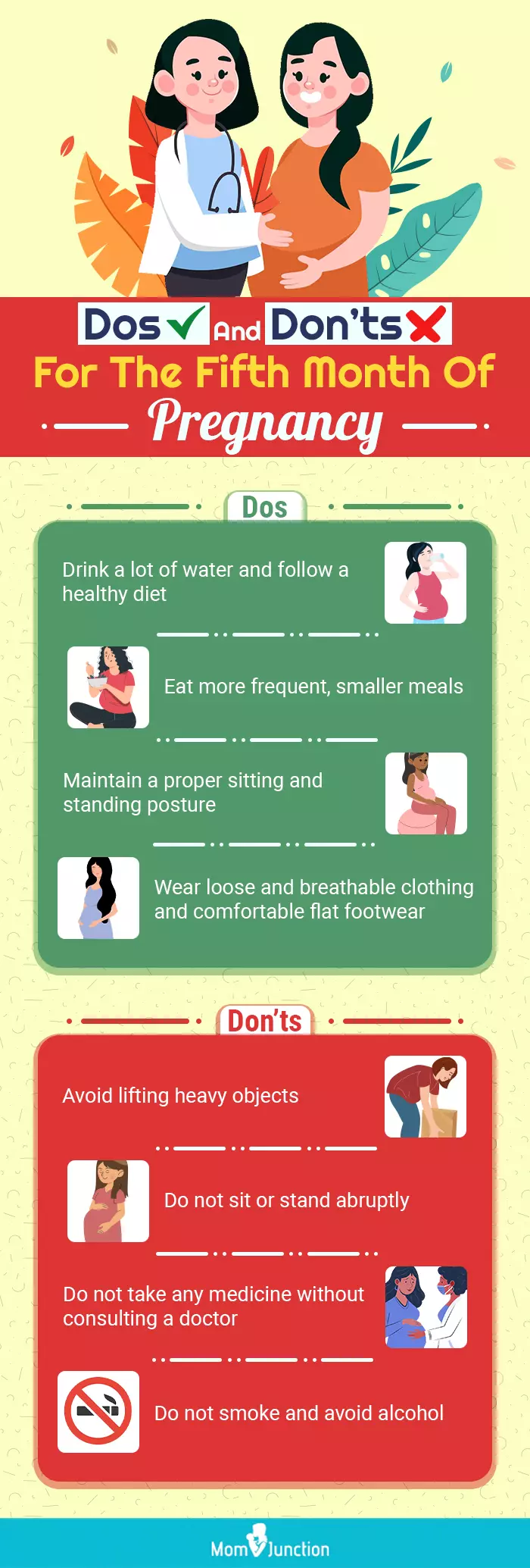
Illustration: 5 Months Pregnant: Symptoms Belly Size & Baby Development

Image: Dall·E/MomJunction Design Team
Personal Experience: Source
MomJunction articles include first-hand experiences to provide you with better insights through real-life narratives. Here are the sources of personal accounts referenced in this article.
i. Almost 5 months pregnant;https://shepregnant.blogspot.com/2013/01/almost-5-months-pregnant.html
References
1. Stages of pregnancy, U.S. Department of Health and Human Services
2. What happens in the sixth month of pregnancy?, Planned Parenthood Federation of America Inc (2019)
3. Leg cramps during pregnancy, Healthdirect
4. Pregnancy – week by week, Health and Human Services (2012)
5. Week by Week Fetus Size Demonstrated by Fruits, EPAOA (2014-2019)
6. Fetal Development, UNSW Embryology (2018)
7. Fetal development – month 5, Sutter Health (2018)
8. Prenatal Form and Function – The Making of an Earth Suit, THE ENDOWMENT FOR HUMAN DEVELOPMENT, INC (2001-2019)
9. 18 Weeks Pregnant: Your Body Shape Begins to Change, National Women’s Health Resource Center, Inc
10. Quickening and Baby Movements: 4th, 5th, 6th, 7th, 8th Month, Sitaram Bhartia Institute of Science and Research (2016)
11. Nutrition During Pregnancy, ACOG
12. Listeria Infection (Listeriosis), Organization of Teratology Information Specialists
13. Pregnancy Precautions: FAQs, The Nemours Foundation (1995-2019)
14. How Celiac Disease Affects Pregnancy, Celiac Disease Foundation (1998-2018)
15. Morphology scan, Healthdirect.
16. Common Tests During Pregnancy, Stanford Children’s Health (2019)
17. When to call us, Kaiser Foundation Health Plan, Inc (2018)
18. Prenatal care in your second trimester, NIH (2019)
19. What are some common complications of pregnancy?, NIH (2017)
20. What are the symptoms of pregnancy loss (before 20 weeks of pregnancy)?, NIH (2017)
21. Stillbirth, NIH (2016)
22. Low Blood Pressure – When Blood Pressure Is Too Low, American Heart Association, Inc (2019)
23. What happens in the fifth month of pregnancy?; Planned Parenthood(2019)
24. Is ‘pregnancy brain’ real or just a myth?; The University of Texas Southwestern Medical Center
25. Advice about Eating Fish; FDA
26. What Causes My Belly to Feel Hard and Tight? Lamaze International
27. Stomach pain in pregnancy; NHS
28. Pains in your second trimester; HSE
29. Gestational Diabetes; Centers for Disease Control and Prevention
30. Preeclampsia; March of Dimes
31. How can you manage anxiety during pregnancy?; Harvard Medical School
32. Employment Considerations During Pregnancy and the Postpartum Period; National Library of Medicine
Community Experiences
Join the conversation and become a part of our nurturing community! Share your stories, experiences, and insights to connect with fellow parents.
Read full bio of Dr. Vimee Bindra
- Dr. Alan Lindemann is an obstetrician and maternal mortality expert, who worked as a clinical associate professor at the University of ND. An alumnus of the University of ND and the University of Minnesota, he is a member of the American College of Obstetricians and Gynecologists and the American Medical Association.
 Dr. Alan Lindemann is an obstetrician and maternal mortality expert, who worked as a clinical associate professor at the University of ND. An alumnus of the University of ND and the University of Minnesota, he is a member of the American College of Obstetricians and Gynecologists and the American Medical Association.
Dr. Alan Lindemann is an obstetrician and maternal mortality expert, who worked as a clinical associate professor at the University of ND. An alumnus of the University of ND and the University of Minnesota, he is a member of the American College of Obstetricians and Gynecologists and the American Medical Association.
Read full bio of shreeja pillai
Read full bio of Rebecca Malachi
Read full bio of Aneesha Amonz










